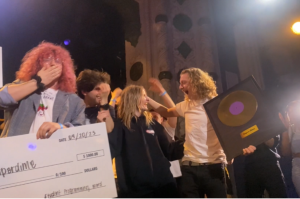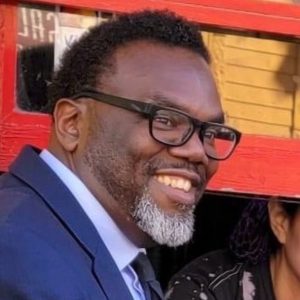Story by: Lisa Wardle
May 5, 2009 – A public garden thrives in what was once a vacant lot on the south end of Hyde Park. But looming plans to develop the area may transplant the garden into a new location or result in other changes to the cultivated community.
The University of Chicago, which owns the garden’s property, plans to use the land as a staging area for construction of the future Chicago Theological Seminary (CTS) building, which will be one block north of where the garden currently stands.
The university has allowed it to be used as a public space for the past 10 years. Now that the school has purchased the current CTS building, 1164 E. 58th St., at the center of its campus, part of the deal was to build the seminary a new facility at 60th Street and Dorchester Avenue.
“When we were in initial conversations with [the University of Chicago], we understood that our new building would not affect the garden,” said Alice Hunt, president of CTS. “Then the university said they needed to use the garden’s land as a staging area for the new building because there wasn’t other vacant space they could use.”
Garden coordinator Jack Spicer and community activist Jamie Kalven said there appears to be other available spaces for staging on the same block, and they are skeptical that the university really needs so much land for staging construction.
“I don’t know what type of building [CTS] is going to be, whether it’s steel or concrete,” said Spicer, who has spoken to an engineer about the situation. “But since the 1880s we’ve been building skyscrapers without even blocking a sidewalk.”
Spicer and Kalven said they also recently learned the university plans to use the area as a parking lot once the seminary is constructed, though Steven Kloehn, news director for the University of Chicago, said no long-term plans have been set for the space.
The 61st Street community garden sits on the corner of 61st Street and Dorchester Avenue, an intersection also home to a steam-driven power plant, a community venue called the Experimental Station, Backstory Café, Andrew Carnegie Elementary School and the 61st Street farmers market. The garden brings residents of Woodlawn and Hyde Park, as well as University of Chicago students and faculty, together on a daily basis to garden and develop personal connections with their neighbors.
Spicer and Kalven would like to see the block used as a “sustainability quadrangle” and want to involve people who frequent the various institutions on the block in a conversation about the garden’s future.
While Spicer would like to see the garden remain in its current location, he recognizes that there may also be benefits to use as a staging area or parking lot.
Neither CTS nor the university wants to see the community garden disappear, according to spokesmen from both schools.
“We’re looking to build on what has been, for many years, undeveloped land,” said Bob Rosenberg, associate vice president for news communications at the University of Chicago.
He said last year construction on the same block on the South Campus Chiller Plant, which chills and pumps water for air conditioning, resulted in damage to the garden. That experience, he thinks, indicates why the garden should be moved.
“A new location is in the best near-term and long-term interest of the garden and the gardeners,” Rosenberg said.
CTS faculty and students have been actively involved with the design process of their new building and have tried to steer away from affecting the garden with their move.
“There are ongoing discussions with [garden] leaders, as well as gardeners, about relocating,” said Rosenberg. “Gardeners need to agree on a specific location. We’re just part of the process; we’re not leading the process. Hopefully, by fall we’ll have identified a site and be ready to move [the garden].”
The university has offered to move the topsoil—which has benefited from years of cultivation and become rich in nutrients—to a new location, but that may not be enough for some gardeners.
“The garden has expanded the idea of what is a safe space,” said gardener Shula Bien, who is also a University of Chicago graduate student. “It’s becoming a more happening corner. When I was an undergrad, there was a sense of not going past 60th Street, past the Midway. A lot of students would act like [the campus] was a fishbowl.”






Be First to Comment